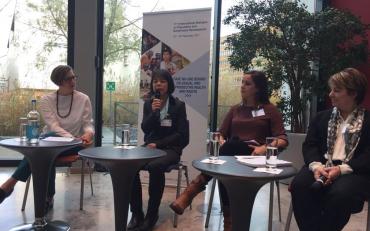Berlin | 23 - 24 November 2017
Theme of meeting: Leave no-one behind on sexual and reproductive health and rights
The 15th annual International Dialogue on Population and Sustainable Development took place in Berlin, two years after the adoption of the 2030 Agenda for Sustainable Development. The focus for the 15th session was on the sexual and reproductive health and rights of those hard to reach populations – young people, persons with disabilities, and people living in fragile settings.
The dialogue opened with the keynote speech by Natalia Kanem, Executive Director of the United Nations’ Population Fund (UNFPA). Among various important issues the agency has been implementing, she mentioned the project collaboration with IDA, by working with young people with disabilities, facilitating conversations among these young people and other relevant stakeholders about their sexual and reproductive health and rights.
Following the keynote speech, the conference session entitled “Expert talk: spotlights on the SRHR of hard-to-reach and vulnerable groups” took place. Silvia Quan, Senior Human Rights Advisor, representing the International Disability Alliance, spoke about the main challenges faced by persons with disabilities when implementing their SRHR. Ms Quan pointed out that the SRHR of persons with disabilities were not fully recognized, and rather, were violated frequently due to harmful stereotypes which portray persons wit disabilities, but particularly women and girls with disabilities, as asexual or hypersexual, as lacking the capacity to fully understand these issues, as not being able to control their desires, and as not being able to rear children. Other speakers to this session were Sarah Keogh (Guttmacher Institute) and Sandra Krause (Women’s Refugee Committee), and the moderator was Heather Barclay.
Ms. Quan also mentioned frequent violations to SRHR of women and girls with disabilities, such as non consentual or forced sterilization, and hormonal or surgical treatments for menstrual management. The session continued with recommendations for organizations of persons with disabilities, civil society organizations, and persons with disabilities individually, to learn about and utilize the available international human rights protection mechanisms, in this particular case, the UN Committee on the Rights of Persons with Disabilities.
To learn more about the 15th International Dialogue, visit: http://www.dialogue-population-development.info/upcoming-dialogue-population-development.html
Contact at the International Disability Alliance: Silvia Quan, Senior Human Rights Advisor, squan [at] ida-secretariat.org

